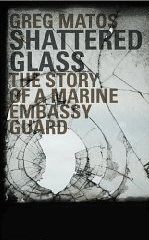Shattered Glass: The Story of a Marine Embassy Guard

“Shattered Glass: The Story of a Marine Embassy Guard”
By Greg Matos
Two Harbors Press
Minneapolis, Minn, 2011
Memoir offers insights into military service
Reviewed By Paul Efthim, Ph.D.
Unlike most military memoirs, “Shattered Glass” offers both first-person combat reportage and penetrating insights into how military service impacts the psyche.
Written by Greg Matos, a doctoral student at the Massachusetts School of Professional Psychology, this book describes his journey from a gung-ho Marine recruit wanting to escape his hometown of Bristol, R.I. to the brutal recruit training at Parris Island to his eventual ascent to elite guard units stationed at embassies around the world.
The key events of the story took place on Dec. 6, 2004 at the U.S. Consulate in Jeddah, Saudi Arabia. On that morning, Matos was the only Marine on duty. Suddenly al-Qaeda terrorists launched an assault on the compound. He describes in detail the harrowing emotional and tactical challenges of coordinating the defense of the facility and the protection of a large group of diplomatic employees who were trapped during an extended firefight. Six employees, all foreign nationals, lost their lives. Matos was not physically injured but experienced highly traumatizing levels of combat stress.
Although the attack forms the centerpiece of the book, the bulk of the story consists of a young psychologist-in-training’s efforts to understand the emotional currents inside him prior to that fateful day and to recover from its aftermath. Matos turns his clinical gaze inward, showing how family dynamics, individual vulnerabilities and a yearning for fatherly guidance drove him to the recruiting center the day after 9/11.
He tells the story of becoming a Marine in the form of keenly observed vignettes drawn from training and daily life during deployments prior to Saudi Arabia. More than most military memoirists, he pays particular attention to aspects of gender, culture and social class differences within and among his colleagues.
The author’s description of the attack captures how the extensive psychological conditioning from Marine training prepared him to manage his emotions; he shows how he self-soothed, saying “I’m a Marine, I can do this” as he prepared to hit the attackers with tear gas. His story also emphasizes how split-second choices made in the heat of battle can lead to nagging doubts. What if I had been quicker? Would that have saved more lives? Matos describes both warrior guilt (no Americans were killed but quite a few non-American consular employees died) and a type of warrior shame (evoked when recognizing that his mission privileged American lives over nationals’ lives).
Disturbingly but perhaps not surprisingly, it appears that Matos received no meaningful mental health treatment following the attack to help speed recovery from the complex effects of the trauma. He describes a variety of PTSD symptoms that persisted for a time, including emotional numbing, intrusive recollections of the event and increased anxiety. Paradoxically, this soldier planning to become a psychologist someday was also the same soldier who wanted to avoid talking about the attack, particularly with someone who wasn’t there.
In fact, since enrolling at MSPP Matos has been working to rectify this type of situation, helping form a program that supports returning military veterans who are interested in careers in mental health care. After he earns his Psy.D., Matos plans to return to the Marines, this time as a clinical psychologist. No doubt he will carry much credibility with him wherever his career takes him.
Earnest and vulnerable, “Shattered Glass” is recommended for clinicians working with veterans as well as for veterans themselves and their families.
Paul Efthim, Ph.D. is a licensed psychologist in private practice in Brookline, Mass. and holds a faculty appointment at the Boston Institute for Psychotherapy.
Learn more about the book: Shattered Glass - The Story of a Marine Embassy Guard
